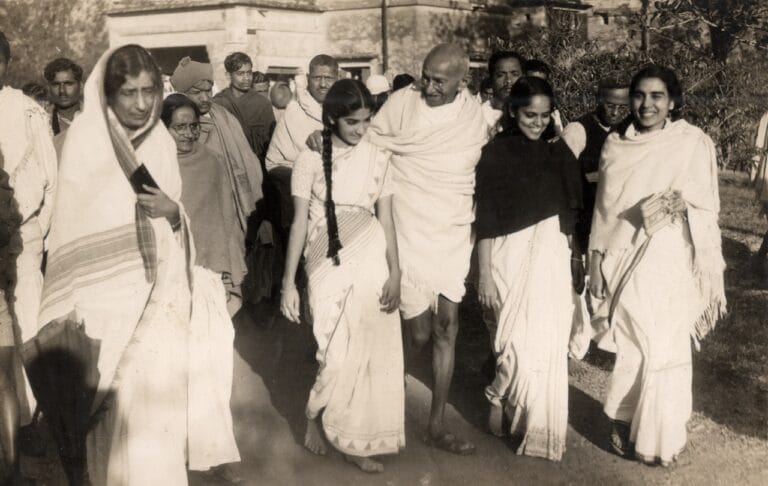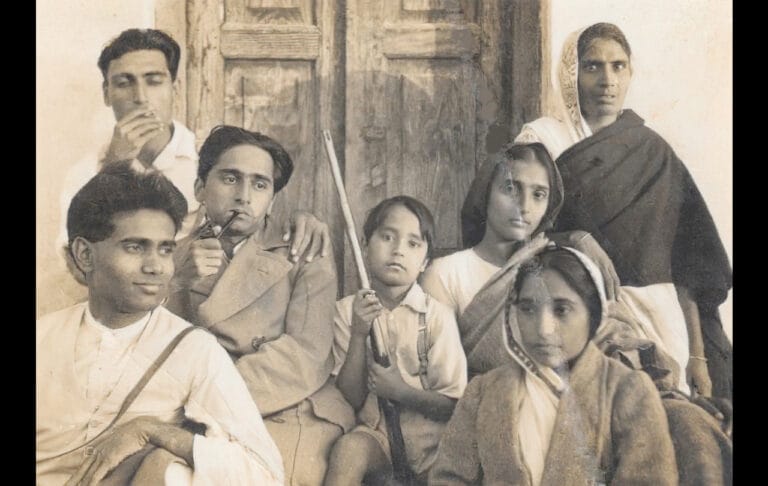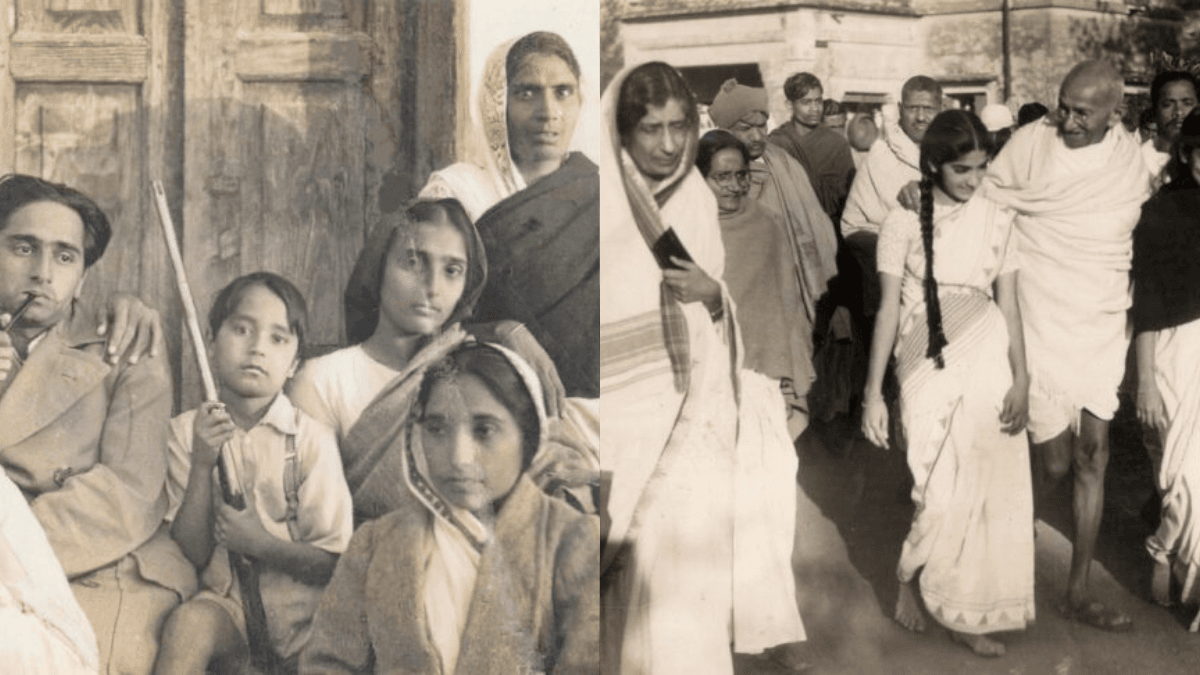The World is Family (Vasudhaiva Kutumbakam in Hindi) is an oral historical tale that tries to weave the past and present, and personal and political together. It is a tale of a family who was part of the country’s Freedom Movement when the movement was at its zenith. The cinematic essay turns the camera inward and goes on a journey that seems to be forgotten by their fellow countrymen. Through the comic yet compelling interactions and visceral interventions of parents, aunts, uncles and close family members of the filmmaker, the documentary looks through the dreams of freedom fighters’ generation and leaves us grappling with the present – a political landscape so unrecognisable to those eyes.
A generation that had long ago fought for India’s independence from the clutches of colonial rule. A movement that was, in their mind, not just about Independence, but principles, ideals, and dreams. It was not a mere birth of yet another nation rooted in force and violence and the gain of political freedom but was more about what was right and what was not.
While that generation waned through age, the younger generation seems rather distant from those ideals with a sense of aloofness and ignorance. Home-shot video clips of ageing parents are beautifully put along with the archival footage intricates in an admiring effort to the oral history of those distant times. The scenes of a family with vibrant narratives of past and future are the pedestal at which this so very personal and still political cinematic essay stands.
The India that has forsaken the ideals of independence movement
The filmmaker of the documentary, Anand Patwardhan is acclaimed for dealing with unsettling questions in contemporary India and his work has always irked those in power. A pioneer in his field, Patwardhan through this milestone cinematic piece gazes the political history of the nation through the prism of his family. He tries to paint a portrait of his parents whose lives had taken shape in the context of the Indian national movement under the shadowing presence of Mahatma Gandhi. Mahatma had a deep impact on their thinking and worldviews.

The World is Family compiles the family bonds alongside the tumultuous political turnarounds that occurred on India’s way towards Independence. It brings a message from India’s freedom movement for today’s India. A country that feels lagging far behind from the original ideas, dreams and promises that were made and dreamed at its founding.
The World is Family is undeniably a beautiful portrayal of personal and political. The filmmaker in this cinematic essay takes the camera to his home filming the parents, uncles, aunts, and other near and dears while bringing back to life their lives during the Gandhian Satyagraha. Weaving a narrative, it comes as far as the contemporary times and tries to contextualise the current realities into the context of freedom struggle with its hopes and dismay.
The World is Family connects all the dots from the moments of independence to the present. The film talks rather nostalgically about an India that for its characters does not exist anymore. It reminds people what we as a country could have been. How we have forgotten and forsaken the values that were instilled in the generation of freedom fighters and which were to become the ideals of the Republic. A country that now celebrates the violence and the bravado over suppressing the meek was not the country that those people had envisioned.
Filmmaker’s mother Nirmala with her witty remarks and poignant interventions makes the documentary a living personal document on the one hand and deeply historical on the other. She elaborates how she was a part of the associates that accompanied Mahatma Gandhi before his assassination at the hands of Hindutva fanatic Nathuram Godse. Anand’s uncles late Rau Kaka and Achyut Kaka had taken part in Salt Satyagraha during the 1930s, the family recollects their role in those epitomical moments. After the country had finally gained Independence, disillusioned with the direction it had taken both of them distanced themselves from the politics.
A personal journey of hopes and disillusionment with political in The World is Family
The World Is Family is a tale of love, connection and family ties with a longing for the country of their dream which is forced to face the actual political realities and confronts the directions that its society, politics and leaders have taken after the independence. The intricacies of a couple during their old age showcase the heartfelt corners of elderly parents, the vulnerabilities of an endured relationship and a lament for a past dream that has been lost – that has not come to be true because of what their country has become.

On how he ended up making a documentary of his homemade family materials, Patwardhan spoke “As my parents began to age, I began filming to preserve their memory for myself. I filmed from the late 1990s till they passed away in 2008 and 2010, respectively. By this time, I was also talking to my father’s younger brother and oral history about India’s freedom struggle had begun to emerge. Then during the Coronavirus lockdown, I began to edit all the materials and realized that it could be valuable for others too.”
Thousands of volunteers influenced by Gandhian principles had imagined a nation which would embrace non-violence and embark on a journey of undoing the wrongs of the past, correcting the historical injustices to millions of their own people – this dream was in complete tatters now and the country was heading in an altogether opposite direction.
“The India that our freedom fighters had aspired to build was an inclusive India very different from the hate-filled version of ‘nationalism’ that is being peddled today.” Secularism and humanism were so intrinsic to Freedom struggle and Gandhian movement, says Patwardhan, therefore “the film is glimpsing the past in a way of re-imagining a future very different from the hate-filled reality of our present.“
The filmmaker’s parents, uncles, aunts, family friends and even his grandmother had acted on Gandhi’s call to join against the British. Rau and Achyut had acted on the call of Salt satyagraha from Gandhiji. But both chose differing paths – Rau chose to follow Gandhi and his non-violence and was in jail for many years; Achyut became a revolutionary operating in hiding and resorted to violent means. The delicate nuances of this cinematic piece also deal with the conflicting notions of resisting a colonial rule and ponder whether what is the right and what is the moral choice of resistance in such circumstances.
Combining archival photos, newsreel footage, and newspaper headlines, helped by a forceful narration, Patwardhan with his brilliant work of editing assembled candid conversations in English, Marathi and Hindi with close ones and relatives. The 96-minute documentary has the backdrop of all his earlier work with the themes of right-wing extremism and divide among communities.
The World Is Family also calls out the insanity and insidious nature of the plans to divide the subcontinent into religious lines and recollects the horrors of the Partition. The film sees the shared religious culture of the subcontinent as the antidote to the bigotry and the politics of hate we see in our times. Cultural heritage and social harmony have the strength to break through the barriers of nationality, religion, and caste and work towards divisive politics harbouring communal vulnerabilities.




